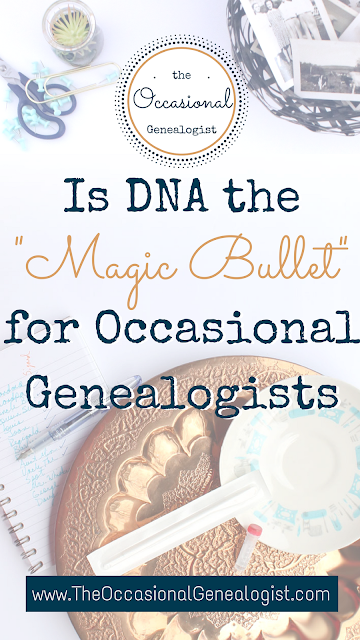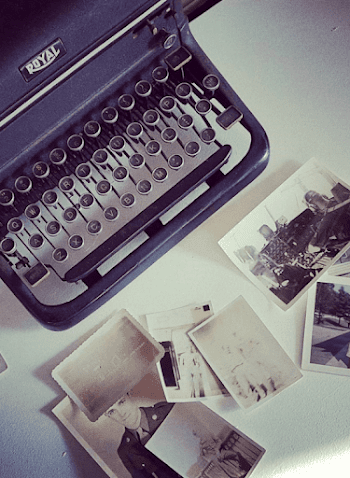If you've had a genealogical DNA test done, you probably know the answer to this question.

I know questions about using DNA are almost always the first thing people ask me when they find out I'm a professional genealogist. Today's post gives you an answer aimed at Occasional Genealogists.
Right up front, the answer is "no." DNA is not a magic bullet for any type of genealogical problem or for any type of genealogist. It may work wonders for certain problems, but people seem to think it will work like a magic bullet (well, magic sledgehammer) on their brick wall.
You will not spit/swab, send off your sample, receive the results, and suddenly have a solution to all your problems. You'll be lucky if you can get a solution to one problem, and that will only happen if you've done lots of prep work.
DNA results require something to compare them to. The ethnicity results you receive compare your results to a large sample of data. In that case, you don't have to provide the comparison sample. Health information is similar (that is outside of genealogy, so I'm not going into it). Ethnicity results from DNA is a post in itself. If you're interested, start seeking out information online.
DNA results require something to compare them to.
One of the reasons you see T.V. commercials about ethnicity results (or health results) is the company compares your results to samples they provide and reports results from that analysis.
When it comes to getting results about who you inherited DNA from, the company can't tell you this. Separate analysis has to be done for every ancestor you want to identify.
To extremely oversimplify it, you first identify a group of people who inherited DNA from the same source and then determine who that source is. To have ancestral analysis done, you either do it yourself or hire someone.
As an Occasional Genealogist, the more realistic option, time-wise, is to hire someone. That being said, it's "expensive" because it's time-consuming. You will need to pay someone with specialized skills (not just any professional genealogist) to spend time doing the analysis.
If you are the type of Occasional Genealogist who doesn't get to research very often because of access to records, as opposed to lack of time, you may have the time to do DNA analysis yourself. Everything you need is online. (Note: Traditional research has to be used with DNA analysis, but I'm considering that as separate from the DNA analysis.)
RELATED POST: Do I Need a Family Tree If I Take a DNA Test?As an Occasional Genealogist, you may or may not have time/money to use DNA right now. The one suggestion I would make is to consider having older relatives tested, even if you don't have time to delve into DNA today or even in the next few years.
Currently, there is no option to have hair tested (such as a lock of hair from a locket). Once the test subject is gone, you currently can not have them tested for the first time.
[UPDATE: options are becoming available for this type of testing but they are very expensive and may not work. You can't be sure there is viable DNA in the artifact you have so don't think this is a safety net. If you have a living relative to test, test them while they're alive!]
If the living relative has been tested already, you usually can have their sample re-tested when new types of tests (or refinements) become available.
I really wish I would have had my last two great-great aunts tested before they died. Mitochondrial DNA wasn't particularly useful for what I was working on and was the only choice. If either had been tested, I could have had the FamilyFinder test run on the sample.
Both passed away before autosomal DNA was even heard of in the general genealogical community. Mitochondrial testing was extremely expensive at the time, so I probably could not have done it even if I had had a clue about future options, though.
In contrast, autosomal testing is under $100. Family Tree DNA offers autosomal, Y, and mt tests. The same sample can be used for all (and their test is a swab, rather than a spit test, which may be easier for many people).
If you have older relatives who are willing, and you can afford the test, go ahead and have them tested now.
DNA for genealogy is not a magic bullet. It is an extremely powerful new tool to use as PART of your genealogical toolbox. It will take you some time to learn to use autosomal DNA, much longer than Y-DNA or mtDNA.
However, you may be able to solve a problem you have been unable to overcome with traditional methods. DNA isn't an instant solution. Once you do the necessary work, it might produce what feels like magical results when a brick wall finally crumbles.
RELATED POST: Simple DNA Project Tracking Form for EvernoteRELATED POST: Did you know you have a "digital estate" and why genealogists care
RELATED POST: Do I need a family tree if I take a DNA test?











